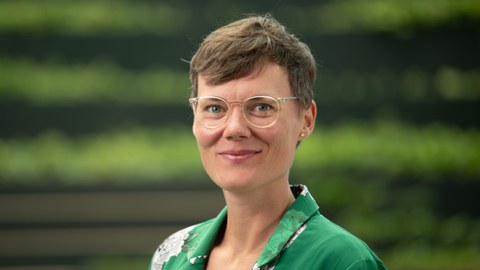Nov 04, 2024
Interview with Prof.Dr. Dorit Brixius

Prof.Dr. Dorit Brixius
Hello Professor Brixius, please introduce yourself and tell us about your research topic.
I've recently been appointed assistant professor in the history of botany and horticulture, a new chair of the faculty of biology. Trained as an early modern cultural historian at the University of Potsdam, I've developed a strong interest in the history of knowledge and medicine, with a particular focus on plants. For my thesis which I completed at the European University Institute in Florence, I've examined the botanical establishment of eighteenth-century Mauritius, which was a French colonial island in the Indian Ocean back then. For my postdoc, I went to Paris to work at the German Historical Institute where I developed a project on the medical practice of the seventeenth-century physician Noël Vallant. Currently, I have two major fields of research: For one, I'm still working on Vallant's medical practice and most recently on facial skin care and cosmetics in seventeenth-century France. For another, and more importantly for my current position, I'm working on the history of Dresden's Botanical Garden in the long nineteenth century. The idea is to write a biography of the Garden and to understand its development from its foundation until the 1930s.
What is one important thing you have discovered during your career as a scientist?
For primary sources on plant related knowledge, I was astonished to see that archives are so much richer than published material might imply. So much information and particularly non-European knowledge got lost over the course of publication, when knowledge became official and when it was 'Europeanised'. Working with archives allows to look 'behind the curtain'. But examining handwritten sources from the past requires a lot of time and patience and it's a privilege to work with them!
What are you looking forward to the most in your new position as assistant professor?
I am really looking forward to developing interdisciplinary research projects. Take my interest in cosmetics: I would love to examine historic recipes and remake them in a lab with the expertise of biomedical scientists (similar to the Renaissance Goo Project)! From there, I am dreaming of developing a course on hands-on knowledge and bring together students of history and biology in a lab. A fantastic (and pioneering) project was developed at Columbia University and where I contributed as a palaeographer back in 2015: The Making and Knowing Project. Check it out!
What do you like most & least about your job?
I like most that I'm paid for my curious and critical mind. I'm paid to think and to stimulate my students' critical mind and to encourage optimism, humanness and civil courage, isn't that great? But I have a feeling that in the natural sciences, (early modern) historians often are misunderstood, maybe even ridiculed, and might seem like 'the odd one out'. We speak different languages and our qualities as an academic are measured differently. Luckily, this is not the case at this faculty where I feel very welcomed and inspired and where I'm having conversations with biologists who are well aware of the fact that we need to find a common language in order to enrich our research and make it truly interdisciplinary!
How does your research challenge traditional narratives in history or biology?
In my recent book Creolised Science, I write about the cross-cultural contributions in plant knowledge in the eighteenth century, which show that there was no superiority of European knowledge and that similar methods were developed independently in different regions of the world. I believe it is an important contribution to rethink the legacies of colonial botany leading away from binary thinking of plant knowledge (scientific/non-scientific). My book is a call to appreciate and investigate historical plant knowledge in its very own cultural contexts.
Which book would you recommend everyone to read?
There are two recent books that I think can help to facilitate a dialogue between history and biology as disciplines: For one, there is the Handbook of the Historiography of Biology (2021). For another, there is Banu Subramaniam's recent book Botany of Empire. Plant Worlds and the Scientific legacies of colonialism (2024). The latter is a must-read for critical reflections on the discipline 'botany', its historical development and colonial legacies. And to lose yourself a little in poetry and the beauty of life when you have an 'academic blues', I recommend Kahlil Gibran's The Prophet which full of life's wisdom and beautiful phrasing!
Thank you, Professor Brixius and a warm welcome from the BioS reports team!
Want to learn more? Read about the assistant professorship here: https://tu-dresden.de/mn/biologie/jprof-geschichte-der-botanik-und-des-gartenbaus?set_language=en
